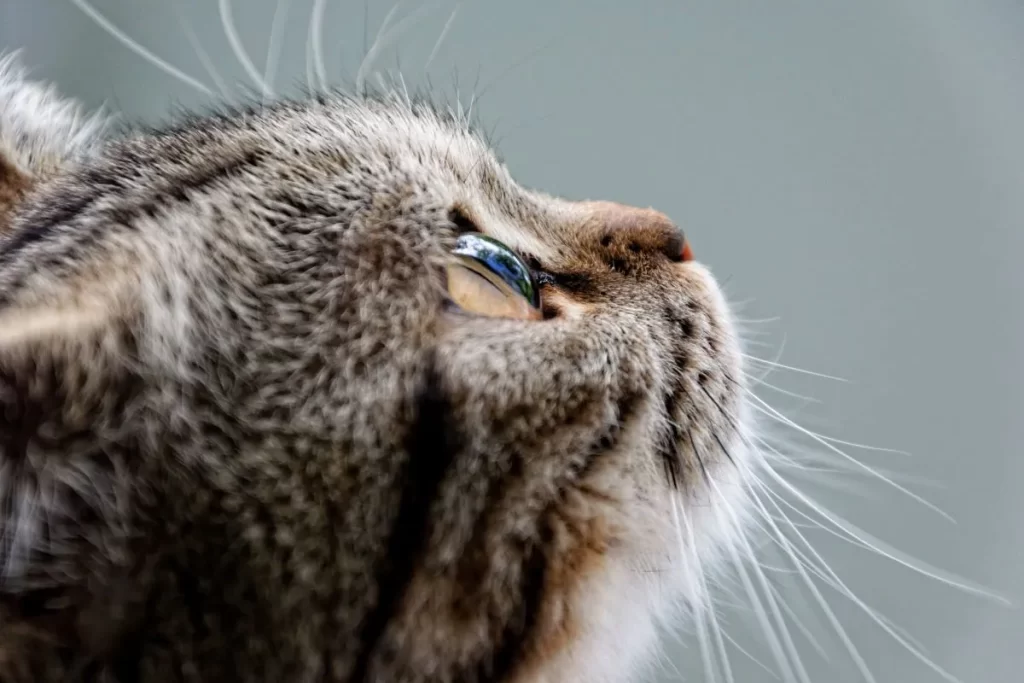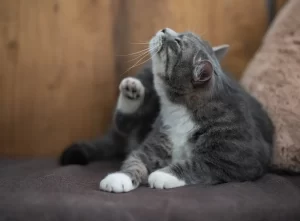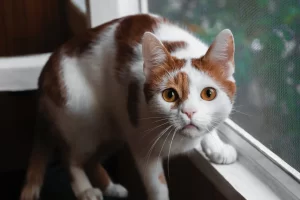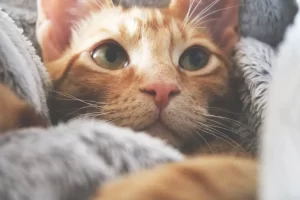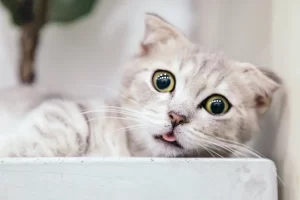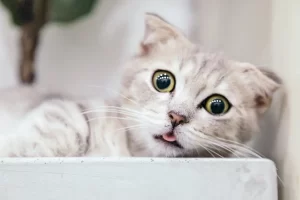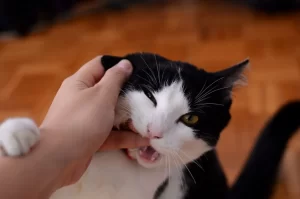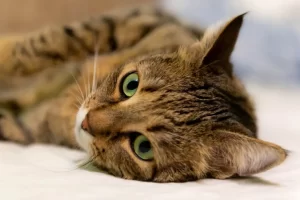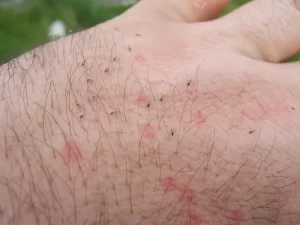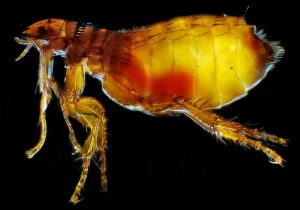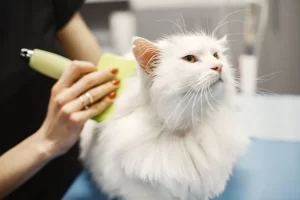Eye infections in kittens can be a serious issue, and it’s important to address them as soon as possible to prevent further complications. While it’s always best to consult with a veterinarian, there are also some home remedies that can be used to alleviate symptoms and promote healing. In this article, we will discuss the causes and symptoms of kitten eye infections, as well as some natural remedies that can be used to alleviate discomfort and promote healing.
Table of Contents
ToggleMain causes for eye infections in kittens
Eye infections in kittens can be caused by a variety of factors, including bacteria, viruses, and parasites. Bacterial infections, such as conjunctivitis, are often caused by the same types of bacteria that cause respiratory infections in kittens. These types of infections can be caused by Streptococcus, Staphylococcus, or Haemophilus species. Conjunctivitis is an inflammation of the conjunctiva, the thin transparent layer that lines the eyelid and covers the white part of the eye. Symptoms can include redness, swelling, discharge, and crusting around the eyes.
Viral infections, such as the feline herpes virus, can also cause eye infections in kittens. This virus is highly contagious and can cause chronic eye infections that can lead to corneal ulcers, scarring, and blindness. Symptoms can include redness, squinting, discharge, and light sensitivity.
Parasitic infections, such as those caused by mites, can also lead to eye infections. These tiny parasites can cause itching, redness, and a sticky discharge. In severe cases, it can cause scarring and blindness.
In addition to these infectious causes, eye infections in kittens can also be caused by allergies, injury, or foreign objects in the eye. Allergies can cause itching and redness, while injuries can cause swelling and discharge. Foreign objects, such as grass seeds or sand, can cause irritation and inflammation.
It’s important to note that some eye infections in kittens can have multiple causes and many of them can have similar symptoms. That’s why it’s always best to consult with a veterinarian to determine the underlying cause and the best course of treatment.
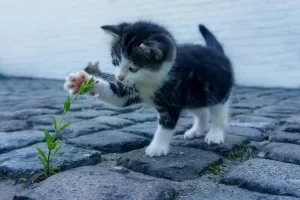
Why are eye infections more common in kittens than cats?
Eye infections tend to be more prevalent in kittens compared to adult cats due to several key factors:
- Immune System: Kittens have underdeveloped immune systems, which makes them more vulnerable to infections of all kinds, including eye infections.
- Increased Exposure: Kittens are naturally more curious and active than their adult counterparts, leading them to explore their environment more, thereby increasing their exposure to viruses and bacteria.
- Crowded Environments: Kittens in overcrowded living conditions, such as shelters or breeding facilities, face a higher risk of infection because of the close quarters and shared resources.
- Litter Conditions: Kittens born in litters with an excessive number of siblings may experience heightened competition for nourishment and resources, increasing their susceptibility to eye infections.
- Congenital or Inherited Factors: Some kittens may inherit or develop congenital conditions that predispose them to eye infections.
- Hygiene Challenges: Young kittens are less adept at self-maintenance and may struggle to keep their eyes clean, potentially leading to infections when dirt and debris accumulate.
It is of paramount importance to closely monitor a kitten’s eye health and consult with a veterinarian at the first signs of eye infection symptoms, such as redness, swelling, discharge, or squinting. By swiftly identifying and addressing eye infections, you can prevent complications and ensure the maintenance of healthy eyes for your kitten.
Home remedies for a kitten with an eye infection
There are several natural remedies that can be used to alleviate discomfort and promote the healing of eye infections in kittens. However, it is important to note that these remedies should be used in conjunction with, and not as a replacement for, veterinary care.
- Warm compresses: Applying warm compresses to the affected eye can help to reduce inflammation and discomfort. To make a warm compress, soak a clean cloth in warm water and gently apply it to the eye for a few minutes at a time.
- Tea tree oil: Tea tree oil has antiseptic properties and can be used to clean and disinfect the affected eye. However, it should be used with caution as it can cause irritation if not diluted properly. It is recommended to consult with a veterinarian before using Tea tree oil as it may not be suitable for all cats.
- Honey: Honey has antibacterial properties and can be used to promote the healing of the affected eye. However, it should be used with caution as it can cause irritation if not diluted properly. It’s recommended to consult with a veterinarian before using honey as it may not be suitable for all cats.
- Eye wash: An Eye wash solution can be made at home using warm water and saline, it can be used to clean the affected eye and flush out any debris or discharge.
- Vitamin A: Vitamin A is essential for eye health and can be given in the form of a dietary supplement, under the guidance of a veterinarian.
- Aloe vera: Aloe vera has anti-inflammatory and soothing properties that can help to reduce inflammation and discomfort in the eye. It can be applied topically in the form of a gel or juice but should be used with caution as it can cause irritation if not diluted properly.
- Chamomile: Chamomile has anti-inflammatory and soothing properties that can help to reduce inflammation and discomfort in the eye. It can be applied topically in the form of a tea bag or as an infusion but should be used with caution as it can cause irritation if not diluted properly.
- Calendula: Calendula has antimicrobial and anti-inflammatory properties that can help to reduce inflammation and promote healing in the eye. It can be applied topically in the form of a tincture, oil, or ointment, but should be used with caution as it can cause irritation if not diluted properly.
- Echinacea: Echinacea has immune-boosting properties that can help to fight off infections in the eye. It can be given orally in the form of a tincture or capsule but should be used with caution as it may not be suitable for all cats.
- Colloidal silver: Colloidal silver has antimicrobial properties that can help to fight off infections in the eye. It can be applied topically in the form of a spray or drops but should be used with caution as it may not be suitable for all cats. It’s important to consult with a veterinarian before using any of these remedies and to follow the proper dosage and application instructions.
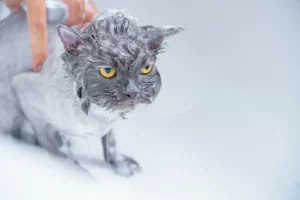
Home remedies for newborn kitten eye infection
If a newborn kitten has an eye infection, the cause can be due to a variety of factors, including bacteria, viruses, or a blocked tear duct. In some cases, the infection may be present at birth, while in other cases, it may develop within the first few weeks of life. The treatment for eye infections in newborn kittens may be different than for older kittens or adult cats, as the immune system of newborns is not fully developed and they may be more susceptible to serious complications.
It is important to take a newborn kitten with an eye infection to a veterinarian as soon as possible, as prompt treatment is crucial to prevent serious complications. The veterinarian may prescribe antibiotics or antiviral medications to clear the infection, as well as eye drops or ointments to alleviate discomfort and promote healing.
As for home remedies, it is important to always consult with a veterinarian before trying any home remedies, as some remedies may not be safe for newborns or may interact with any medication your veterinarian prescribes. However, some safe and effective home remedies that can be used to alleviate discomfort and promote healing include:
- Cleaning the eyes with a warm, damp cloth to remove discharge and crusting around the eyes.
- Using a warm compress, such as a clean washcloth, gently massage the closed eyelid and help open blocked tear ducts.
- Using a few drops of breast milk or colostrum, which contains antibodies that can help fight off infection, in the eye.
- Applying a small amount of coconut oil or olive oil to the eye, can help soothe the area and promote healing.
- Feeding the kitten a high-quality kitten milk replacer, as proper nutrition is important for a kitten’s overall health and can help boost the immune system.
It is important to note that in newborn kittens, eye infections can be serious and require treatment. It is crucial to keep the area clean and avoid touching or rubbing the eyes, as this can cause further irritation and spread the infection. Also, keeping the environment clean and dry can help prevent the spread of infection.
Preventing eye infections in kittens: The importance of hygiene
Maintaining good hygiene is essential to prevent eye infections in kittens. Regular cleaning and wiping of the eyes can help to remove any debris or discharge that may accumulate around the eyes and cause irritation or infection. To clean your kitten’s eyes, you can use a damp cloth or cotton ball to gently wipe away any discharge or debris. It’s important to use a clean cloth or cotton ball each time to avoid spreading any infection.
Keeping the environment clean and free of dust and allergens can also help to prevent eye infections in kittens. This includes regularly cleaning the kitten’s bedding, vacuuming and dusting their living area, and removing any potential allergens such as smoke, mold, or pollen.
Scheduling regular check-ups with a veterinarian is also important in maintaining the health of your kitten’s eyes. They can detect any problems early on and provide appropriate treatment to prevent the development of an infection.
Feeding a healthy diet to your kitten can also help to prevent eye infections. A diet rich in vitamins and minerals, particularly vitamin A, can support the health of their eyes.
Finally, it’s important to be aware of any changes in your kitten’s eyes, such as redness, swelling, discharge, or crusting, and to seek veterinary care if you notice any signs of an eye infection. Early detection and treatment can help to prevent the development of more serious complications.
Differentiating between common eye infections in kittens: conjunctivitis and feline herpes virus
Conjunctivitis, also known as pink eye, is a common eye infection in kittens. It is characterized by redness, swelling, and discharge from the eyes. The discharge is typically clear or white and can cause the eyes to become crusty or sticky. Conjunctivitis can be caused by a variety of factors, including allergies, bacteria, or viruses. Some remedies and treatments have been in use to treat conjunctivitis or pink eye at home.
Feline herpes virus (FHV) is another common eye infection in kittens. It is caused by the feline herpes virus type-1 (FHV-1) and is highly contagious. Symptoms of FHV include redness, swelling, and discharge from the eyes, as well as squinting, blinking, or pawing at the eyes. The discharge is typically clear or yellow and can cause the eyes to become crusty or sticky. Unlike conjunctivitis, FHV is a viral infection, which can recur and be a chronic problem. However, the symptoms can be relieved using feline herpes home remedies.
Some other signs that can help differentiate between these two infections are that conjunctivitis is more likely to affect one eye, whereas FHV may affect both eyes, Conjunctivitis is typically less severe than FHV, and kittens with FHV may also have nasal discharge, sneezing, and loss of appetite.
It’s important to consult with a veterinarian to properly diagnose and treat eye infections in kittens. Proper treatment and management can help to prevent the development of more serious complications, such as corneal ulcers or blindness.
Symptoms of eye infections in kittens
The symptoms of eye infections in kittens can vary depending on the underlying cause, but some common signs to look out for include:
- Redness: The whites of the eyes may appear reddish or pinkish, indicating inflammation.
- Swelling: The eyelids may be swollen or puffy, and the eyes may appear watery.
- Discharge: There may be a clear, yellow, or greenish discharge from the eyes, which can cause the eyes to stick together.
- Crusting: There may be crusting or scabbing around the eyes, especially after the kitten wakes up.
- Squinting: The kitten may squint or blink frequently, indicating discomfort or pain.
- Light sensitivity: The kitten may be sensitive to light and avoid it or close its eyes in bright light.
- Itching: The kitten may be seen scratching or rubbing their eyes.
It’s important to note that some of these symptoms can also be caused by other conditions, such as allergies or injuries. Therefore, it’s always best to consult with a veterinarian for proper diagnosis and treatment. If your kitten has a severe eye infection or shows signs of severe pain, vision loss, or any other concerning symptoms, it’s important to seek veterinary care immediately.
Read More: How often do you take a cat to the vet?
Differences between eye infection and eye discharge
Eye infections and eye discharge are related but distinct conditions. Eye infections are caused by pathogens such as bacteria, viruses, or parasites, and can cause inflammation and discomfort in the eye. Symptoms of eye infections can include redness, swelling, and discharge from the eyes.
Eye discharge, on the other hand, refers to any substance that exits from the eye, such as tears, mucus, or pus. Clear, watery discharge is typically normal and helps to keep the eyes lubricated and clean. However, an excessive or abnormal discharge can indicate an underlying problem, such as an infection, allergies or dry eye. If you think your cat has weepy eyes, you may like these home remedies!
While eye infections can cause eye discharge, not all eye discharge is caused by an infection. For example, excessive clear, watery discharge can be caused by allergies or dry eye. Yellow or green discharge can indicate a bacterial infection, while a cloudy or white discharge can indicate a viral infection.
Risks associated with eye infections in kittens
Eye infections in kittens can have serious consequences if left untreated. Some of the risks associated with eye infections in kittens include:
- Corneal ulcers: Eye infections can cause corneal ulcers, which are open sores on the surface of the eye. These can be extremely painful and can lead to scarring and vision loss if not treated promptly.
- Scarring: Eye infections can cause scarring of the cornea, which can permanently affect vision. This can occur due to untreated corneal ulcers or chronic eye infections.
- Blindness: In severe cases, eye infections can cause blindness. This can occur due to untreated corneal ulcers, scarring, or chronic eye infections.
- Chronic Eye problem: Some types of infections can become chronic (long-term) and can cause recurrent episodes of infections, inflammation, and discomfort.
- Secondary infections: Eye infections can also lead to secondary infections, such as ear or sinus infections if bacteria spread from the eye to other parts of the body. Here are a comprehensive list of home remedies for ear infection and sinus infection that you can take advantage of if your cat is showing symptoms of these secondary infections.
It is important to note that these risks can be minimized or prevented by treating eye infections promptly and correctly. It’s always best to consult with a veterinarian for proper diagnosis and treatment of eye infections in kittens.
Over-the-counter medicines
In the case of eye infections in kittens, there are some OTC products that can help to alleviate discomfort and promote healing. However, it’s important to note that OTC medications should never be used as a substitute for veterinary care, especially when it comes to eye infections.
Some OTC products that can be used to treat eye infections in kittens include:
- Artificial tear solutions: These can be used to lubricate the eyes and help to remove any debris or discharge that may be causing irritation.
- Saline solution: Saline solution can be used to clean the eyes and remove any debris or discharge.
- Eye ointments: Some OTC eye ointments can be used to alleviate discomfort and promote healing in the case of minor eye infections.
- Over-the-counter antihistamines: These can be used to alleviate symptoms of allergies, which can contribute to eye infections in kittens.
It’s important to always read the label and follow the directions for use carefully when using OTC products and to never use them for more than a few days. If you suspect your kitten has an eye infection, it’s best to consult a veterinarian for proper diagnosis and treatment. Some OTC products may harm the kitten if not used properly.
Long-term risks of untreated eye infections in kittens
Untreated eye infections in kittens can lead to a number of potential long-term risks, including blindness and chronic eye problems. Some of the most serious complications that can arise from untreated eye infections include:
- Corneal ulcers: These are open sores on the surface of the eye that can occur as a result of an eye infection. They can be extremely painful and can lead to scarring or even blindness if left untreated.
- Chronic eye infections: If an eye infection is not treated properly, it can become chronic and recur repeatedly. This can lead to long-term inflammation and damage to the eyes, which can cause chronic discomfort, vision problems, and even blindness.
- Scarring: Eye infections can cause scarring on the surface of the eye, which can cause vision problems and make the eye more susceptible to future infections.
- Blindness: In severe cases, untreated eye infections can lead to blindness. This is why it’s important to seek prompt treatment if you suspect your kitten has an eye infection.
It’s important to remember that these risks can be prevented by seeking prompt treatment from a veterinarian and following their instructions carefully. It’s also important to maintain good hygiene and prevent exposure to environmental irritants that can cause eye infections.
Nutrition and immunity: Preventing eye infections in kittens
Nutrition plays a critical role in maintaining the overall health and immunity of kittens, including their eye health. A well-balanced diet that includes essential vitamins, minerals, and antioxidants can help support the kitten’s immune system and prevent eye infections. For example, vitamin A is important for maintaining the health of the cornea, the clear outer layer of the eye, while vitamin C and antioxidants like lutein and zeaxanthin can help protect against free radical damage to the eyes.
To ensure your kitten is getting the right nutrients, it’s important to feed them high-quality kitten food that is specifically formulated to meet their nutritional needs. You should also consider consulting with your veterinarian or a veterinary nutritionist to determine the best diet for your kitten, taking into account any underlying health conditions or other factors.
In addition to a healthy diet, you can also support your kitten’s immunity by providing them with plenty of clean water, regular exercise, and a clean and comfortable living environment. Regular veterinary checkups and vaccinations can also help to prevent eye infections and other health problems in kittens.
Eye infections in certain breeds of kittens
Certain breeds of cats, including certain breeds of kittens, may have a genetic predisposition to certain types of eye infections. For example, some breeds like the Siamese and the Himalayan may have a higher risk of developing certain genetic eye disorders such as progressive retinal atrophy, which can lead to blindness. Other breeds may be more prone to certain types of eye infections such as conjunctivitis, due to structural abnormalities in their eyes.
However, it is important to note that genetics is not the only factor that determines the susceptibility of a kitten to eye infections. Environmental factors, nutrition, and overall health can also play a significant role. Some breeds may have an increased risk of infection due to their short nose or eyes that are more prominent, making them more susceptible to irritants and infections.
Preventing eye infections in kittens by vaccinations
Vaccinations can play an important role in preventing certain types of eye infections in kittens, such as the feline herpes virus. Feline herpes virus (FHV) is a highly contagious virus that is common in cats and can cause severe eye infections, including conjunctivitis, corneal ulcers, and even blindness.
The feline herpes virus is most commonly spread through direct contact with an infected cat, such as through sneezing, coughing, or sharing food and water bowls. Cats can also contract the virus by coming into contact with contaminated surfaces or objects. If one of your cats is sneezing a lot, consider testing some of the home remedies for sneezing cats.
Vaccination is the best way to protect your kitten from the Feline herpes virus. A vaccine that protects against the feline herpes virus can be given to kittens as early as six to eight weeks of age, with boosters given every three to four weeks until the kitten reaches 16 weeks of age. Kittens should also receive annual boosters to maintain their immunity. Besides vaccination, there are multiple feline herpes home treatments that can be used if the kitten is infected with this virus.
It’s important to note that vaccination does not guarantee 100% protection, but it does greatly reduce the risk of infection and the severity of the disease if the kitten does become infected. It’s also important to maintain good hygiene, such as keeping the kitten’s environment clean, to help prevent the spread of the virus.
Fleas can cause eye infections in kittens
Fleas and other parasites can play a role in causing eye infections in kittens. Fleas, for example, can cause a lot of discomfort and irritation to the kitten’s eyes and skin. When a kitten is infested with fleas, they can scratch and bite at their own skin and eyes, causing further irritation and even infection. Read this article if you are not sure if your cat has fleas or read this article to see what fleas look like to human eyes.
Other parasites, such as mites or ticks, can also cause eye infections in kittens. These parasites can cause a variety of symptoms, including redness, swelling, discharge, and crusting around the eyes. They can also cause other symptoms such as itching, scratching, and hair loss.
To prevent flea and other parasite infections, it’s important to maintain good hygiene, regularly groom your kitten and use flea preventatives such as spot-on treatments, sprays, and shampoos (or check our full list of home remedies to get rid of fleas in your cat). It’s also important to keep your kitten’s living environment clean, by vacuuming and washing their bedding regularly.
Is eye infections in kittens contagious?
Eye infections in kittens can be contagious in some cases. For example, if a kitten has a bacterial or viral eye infection, it can spread to other cats through direct contact or through contact with contaminated surfaces. Bacterial conjunctivitis, for example, can be caused by a variety of bacteria and can be spread through contact with infected discharge. Similarly, Feline herpes virus (FHV) which is a common cause of eye infections in cats, is highly contagious and can be spread through direct contact with an infected cat, such as through sneezing, coughing, or sharing food and water bowls.
Other types of eye infections, such as those caused by parasites or allergies, are not contagious and cannot be spread from one kitten to another.

